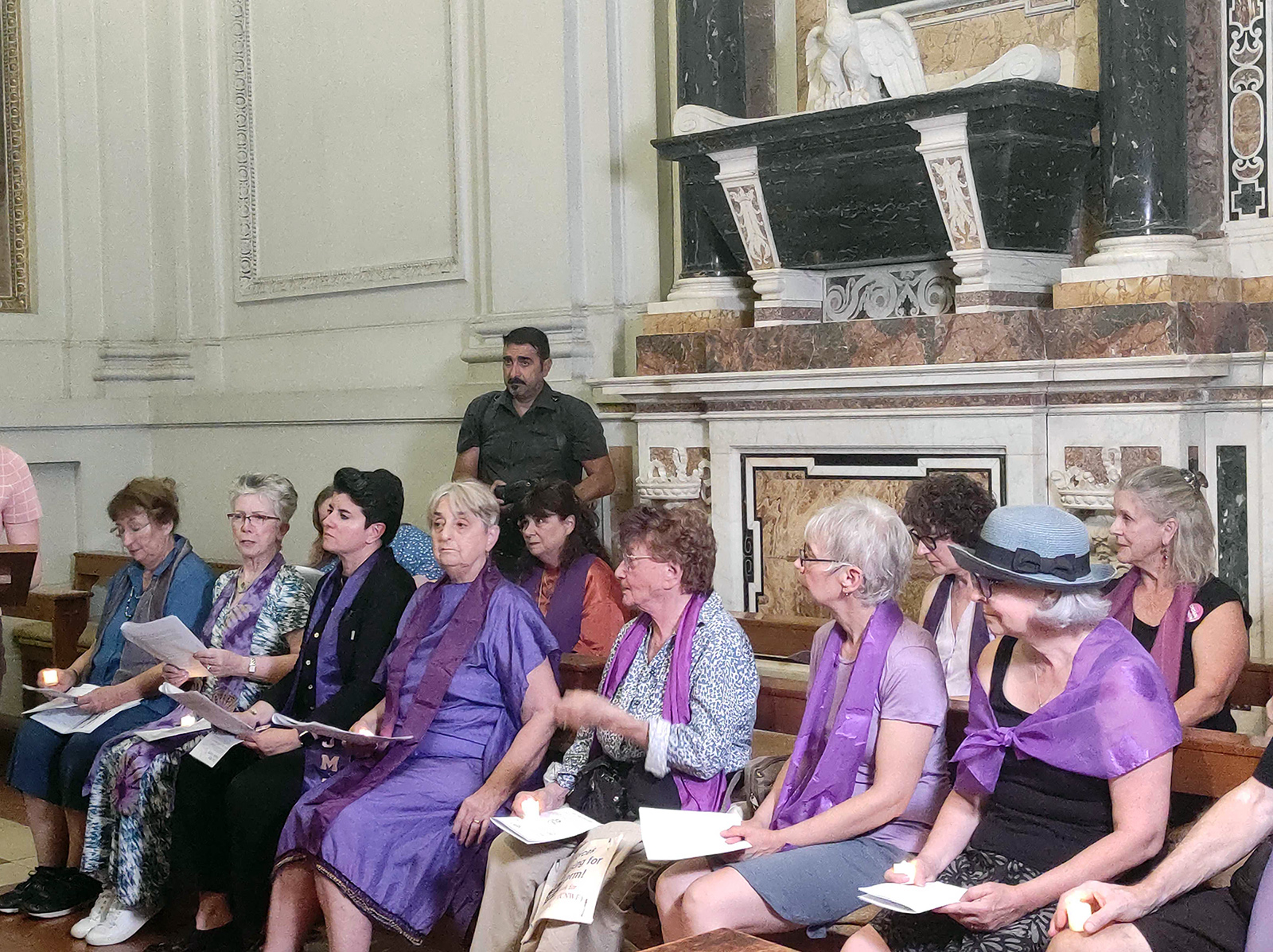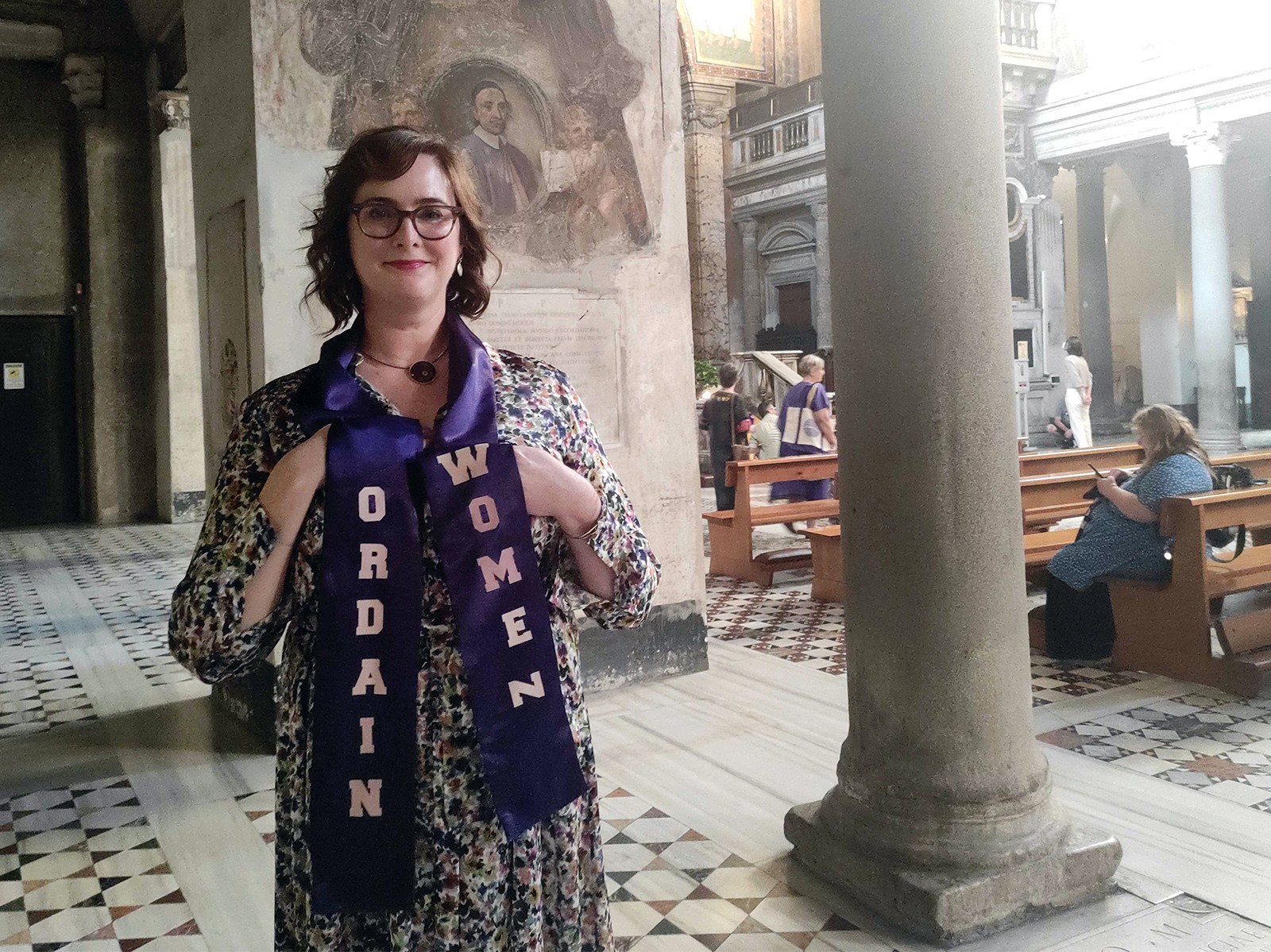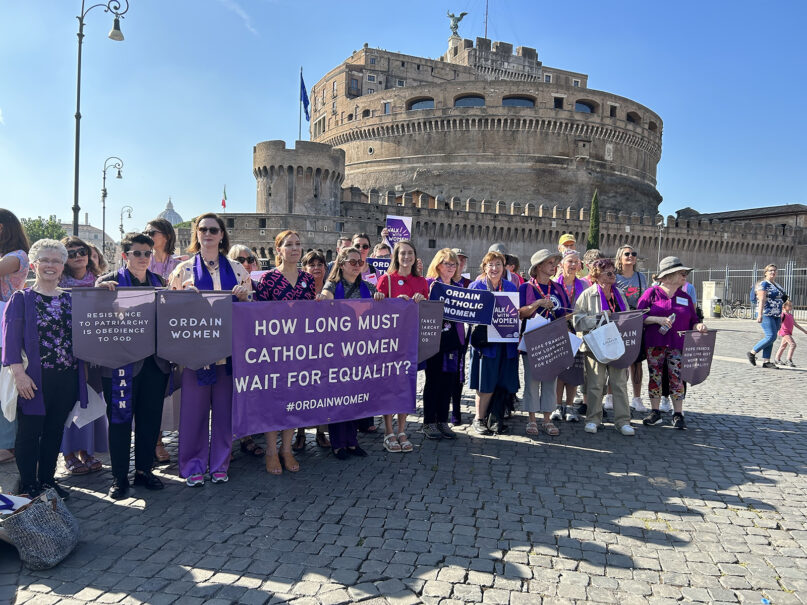VATICAN CITY (RNS) — Advocates for the ordination of women to the priesthood flocked to Rome this week as the Vatican hosts a historic monthlong gathering of faithful to discuss the future of the church.
Dozens of women holding banners calling for female ordination met on Friday (Oct. 6) at the church of St. Giovanni dei Fiorentini — which contains a relic of the foot of St. Mary Magdalene, who is sometimes described as the ‘apostle to the apostles’ — and from there they marched to the Vatican.
Faithful from all over the world, including bishops and cardinals, are gathered at the Vatican for the month of October for Pope Francis’ synod on synodality, born from a massive global consultation of Catholics at all levels, and are poised to discuss some of the most urgent issues in the church, including the ordination of women and the inclusion of LGBTQ faithful.
The Instrumentum Laboris, or working document guiding the discussions at the synod, makes ample reference to the requests by “most of the Continental Assemblies and the syntheses of several Episcopal Conferences” to address the female diaconate, which would allow women to oversee Mass but not sacraments such as the Eucharist and Confession.
“When we received the Instrumentum Laboris we were very hopeful,” said Kate McElwee, executive director of the international network Women’s Ordination Worldwide (or WOW), during an interview with Religion News Service on Friday (Oct. 6).
But women’s ordination advocates worry that limiting the discussion of female priests to only the diaconate, without any mention of the words “ordination” or “ministry,” was a way of “constraining the Holy Spirit.” Despite the obstacles, McElwee believes the event could be “a synod of surprises.”

Women’s Ordination Conference (WOC) members during the “Let Her Voice Carry” vigil in the Basilica of St. Prassede in Rome, Tuesday, Oct. 3, 2023. RNS photo by Claire Giangravé
In the period of consultation leading up to the summit, the Vatican’s synod office published WOW’s resources on their website. McElwee was also invited by the U.S. Bishops’ Conference to speak about female ordination to the U.S. delegates who would be attending the synod, even though, she admits, not many of them came to hear her talk.
“Invitations from the institutional church are new to our movement and signal a novelty,” she said, adding that the synod “not only looks different, but feels different.”
Among the surprises leading up to the synod was Pope Francis’ answer on Monday to the “dubia,” a series of questions submitted in July by conservative cardinals who are concerned the synod is a way of pushing a progressive agenda in the church. Whether the “sacramental ordination of women can be conferred” was among the questions.
In his answer, the pope underlined that the priesthood “should not be understood as a form of domination,” which would make it “difficult to accept that the priesthood is reserved only for men.” He acknowledged the importance of recognizing the rights of women “and the need for them to participate in various ways in the leadership of the Church.”
But he also clarified that there is no “clear and authoritative doctrine” on the question of ordination. “It is not a dogmatic definition, and yet it must be adhered to by all. No one can publicly contradict it and yet it can be a subject of study, as with the case of the validity of ordinations in the Anglican Communion,” he added.
The pope’s words remain ambivalent, but compared to his past pronouncements on the subject, Francis’ answer to the dubia signals an opening. Previously, the pope said his predecessor John Paul II had made the final pronouncement in 1994 when he wrote that the church “has no authority” to ordain women.

Miriam Duignan at the “Let Her Voice Carry” vigil in the Basilica of St. Prassede in Rome, Tuesday, Oct. 3, 2023. RNS photo by Claire Giangravé
“I am feeling very positive,” said Miriam Duignan, co-director of WOW, calling the pope’s recent comments “a blessing for us.” She spoke to RNS at the Basilica of St. Prassede in Rome, where the group held a vigil for the synod on Tuesday (Oct. 3).
“The topic of women’s ordination is unresolved; it is not a settled question or fixed dogma,” Duignan said, referencing the pope’s answer to the dubia. “The question needs to be moved on from those abstract terms and from giving false hope to those who seek justice in the church and reassuring those who cling onto a medieval theology.”
At the vigil, women prayed next to a chapel with a mosaic showing Lady Theodora, mother to Pope Paschal I, with the inscription “Episcopa” (the Latin term for bishop) next to her head. While many experts and historians shrug off the term as a simple honorary, for the women’s ordination advocates it’s proof their dream was true before — and might become true again.
“Christ calls women clearly to be priests and deacons,” McElwee said at the vigil, while expressing her desire that one day “women will no longer have to read between the lines.”





